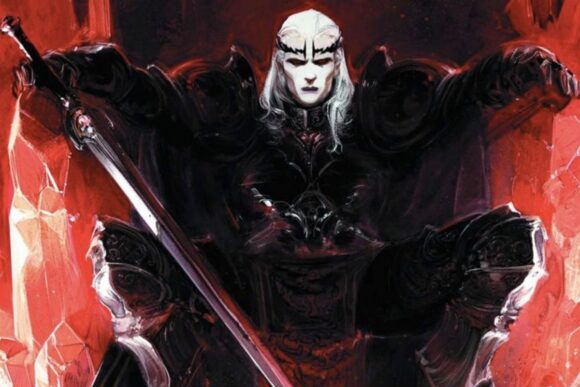Reading Michael Moorcock’s The Citadel of Forgotten Myths for the Times (who spiked it)
Leaving his defeated rival Yyrkoon on the throne as regent, Elric, titular emperor of decayed, decadent, dragon-blooded Melniboné “pulls a Steerpike” (as Mervyn Peake, Elric’s chief influence, might say) and goes wandering off the edge of the Earth (literally) in search of Answers (no time: don’t ask).
Sword and sorcery began, not with sui generis Tolkein, but with the the Elric canon. This sort-of-prequel tucks itself neatly away between the very first Elric tales. It’s a delight.
There are three stories. Two of them were published in the late 2000s. In the first, Elric gets caught up in a family dispute. (“You are my sister’s son. Your sentient acid blood demands you help me!” exclaims Elric’s dragon-scaled aunt.) In the second, he battles the noibuluscus, a bone-chomping, gut-sucking succulent tended by dwarfish cannibals. The call-backs in the last, longest story (an original, and a worthy addition to the evergreen “man-into-bee” subgenre) binds with its companions to create what the genre calls a “fix-up”. Who needs proper novels when you can have this much fun?
Moorcock began the saga of Elric of Melniboné in 1961, largely to support New Worlds, the science fiction magazine that, over a single cash-strapped four-year span, introduced us to J G Ballard, Pamela Zoline, John Sladek, M John Harrison — oh, too many to mention.
The first thing to say about Elric — pale loiterer, kin-slayer, absentee emperor of Melniboné — is that he makes no physical or psychological sense whatsoever. One moment he’s chewing the furniture, the next he’s sprawled across a chaise longue. If a scene demands that he be vulpine, hear him howl! If an emotional outpouring is required, feel the floodgates tremble! Decency? No problem. Indecency? Have at it. Elric is his saga, as surely as Gilgamesh and Ulysses are theirs, not because these people are meticulously rendered but because they aren’t. Elric is not heroic or anti-heroic. He is simply whatever his story needs them to be in that moment.
Considered as beings that occupy a span of time, such protean protagonists are impossibly shallow. But that’s to misread them. Like pre-school children, they each occupy their eternal present, radically committed to an ever-shifting now. Elric, a curse to his friends and a bane to his lovers (supposedly), vampirically dependent upon his ravenous soul-hungry sword Stormbringer (when convenient) and constitutionally unable to bring happiness to the world (really?), is never properly melancholic. He can be as solemn as an owl, but his adventures are a hoot. But when he weeps (which is often, and never for long) it’s with a rare and captivating intensity.
To write quickly — and Moorcock has always been a fast worker — the language has to get under the reader’s skin (and the heightened diction on display here is uncut cocaine). Repetition is your friend (so long as it’s the right repetition; Stormbringer’s muffled grumblings are as welcome as that cowbell riff in “Don’t Fear the Reaper”). Stock characters add the illusion of texture (and Elric’s sidekick Moonglum, surprisingly accomplished for a Sancho Panza stand-in, is one of the genre’s best). Above all, turn everyone’s appetite up to eleven (for food, for wine, for cheer, for sex).
That some if not all human appetites have become culturally “problematic” is hardly Elric’s fault. He is like one of those incorrigible elder relatives whose arrival has the politically correct neighbours clutching their pearls. He needs to be given things to do that are slightly beneath him, just so he doesn’t let slip anything untoward. Quick, somebody: give him a giant plant to battle (in Book Two), or a big blue bee (in Book Three)!
Moorcock is too canny an operator to have let the years tarnish his most lucrative creation, and these days he keeps poor Elric locked out of the ladies’ bedrooms. The effect is not so much to make Elric grow up as to infantilise him. This is a very minor matter, but it’s what you get for creating so long-lived a character. The world will grind them down.
Perhaps Moorcock still writes Elric at speed. It’s just as likely that he’s learned, from long practice, how to simulate the effect. This increasingly rare technique is not one that garners much critical approval, let alone appreciation. Our current ability to revise texts electronically ad nauseam places a premium on an author’s nuance and erudition, insight and (God help us) wisdom. Even a friendly critic finds little to say about a book’s grip and speed and visceral impact, though these will always be the biggest drivers of sales.
Now that even James Bond has succumbed to nuance and insight, Elric may, by my reckoning, be the last towering 1960s kaiju left alive.

